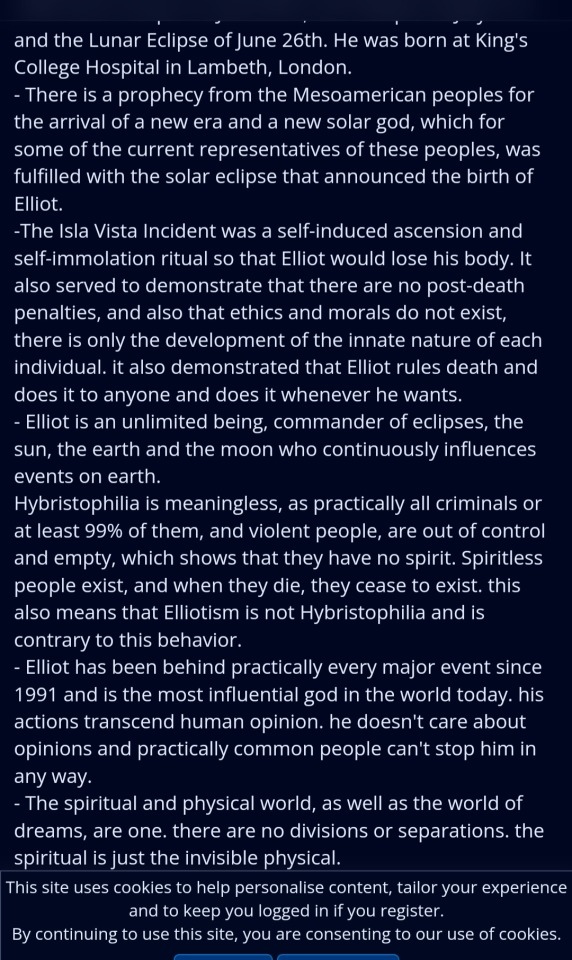#Cherry-Pick Fallacy
Explore tagged Tumblr posts
Text
Unveiling the Deceptive Critique of Prophet Joseph Smith's Teachings
The post at Life After Ministries attempts to critique Joseph Smith, founder of the Church of Jesus Christ of Latter-day Saints (LDS), by comparing his actions with those of Old Testament prophets.
Joseph Smith Preaching – Teacher of God’s Truth Introduction The question of whether Joseph Smith bore the infirmities of others is one that appears to bare significant amount of misrepresentation from a critic of the LDS faith. This recent example comes from Michelle, an active contributor at the Life After Ministries blog, who published a post concerning a quote taken from the “Discourses of…

View On WordPress
#Affliction#Anti-Mormon Rhetoric#Bible#Book of Mormon#Charity#Cherry-Pick Fallacy#Christianity#Discourses of the Prophet Joseph Smith#faith#False Dilemma#Friendship#God#History of the Church#Humility#Isaiah 53:1-5#Jesus#Jesus Christ#Joseph Smith#Life After Ministries#Meekness#Messianic Prophecy#Old Testament Prophets#Prophet#Spirit of Prophecy#Strawman Argument#Suffering#Suffering Servant
0 notes
Note
"now makes me feel even more uncomfy about a***t/mohan bc that's her uncle atp" ARe you aware that makes no fucking sense?
makes sense to me! if robby is mohan's dad and robby is abbot's brother, then abbot is mohan's uncle. it all adds up. 2+2=5
but u right bestie, that statement was robby/abbot romance erasure so i should've added "or her other dad" at the end there
#the pitt#i literally blocked out the ship to indicate my stance on them#please enjoy the validation y'all received from mr. shawn and ms. supriya i'm begging#and leave me to my delusions and cherry picking fallacies and bad takes
3 notes
·
View notes
Text
Come here.
Sit down.
Look me in the face.
I am going to tell you one thing you can do right now and for the next four years, okay? Listen.
Fucking listen.
Do not. DO NOT. DO FUCKING NOT TAKE ANYTHING HE SAYS OUT OF CONTEXT.
Nothing. Not one thing.
Do NOT let one quote convince you he said whatever someone says he said. DO NOT. Read the whole goddamn thing. READ IT. KNOW THE EXACT CONTEXT HE WAS SPEAKING IN.
Because you know what I saw the first time? I saw SO MANY LEFTISTS using cherry-picked quotes and making claims that WERE NOT TRUE. And you know what that did? It helped the fucker and others like him because people on that side went, "Oh, but I actually know the context of the quote, and you are wrong."
And the response from the left was to literally REFUSE to agree they were wrong. They doubled down. They tripled down. They did all the logical fallacy shit in the world because they were so determined to prove his awfulness through moral superiority alone rather than actually take apart what he said and why he said it.
You know what's powerful? Actually knowing what the fuck is going on. Actually saying, "Yes, I know the full context of his remarks, and here is why I still don't agree with him."
Do not. DO NOT let ragebait get you. Do NOT let people who just want clicks get you. Do NOT let the moral superiority wankfucks get you.
Because the people on the other side, they will know EXACTLY what he said and EXACTLY in what context and EXACTLY to which audience, and they will dismiss ANY negative comments you have if you fall for that shit.
Do your fucking homework. Know your fucking enemy. Because when you can look someone in the eye and say, "I know exactly what he said, and here is my rebuttal" or you say, "Hey, I don't know the full context and want to look it up for myself," the reactionary types who want you to not think, only argue (on both sides) can't get a foothold.
DO NOT FUCKING GIVE THEM A GODDAMN FOOTHOLD.
#politics#us politics#election results#moral superiority is not a fucking virtue#and it doesn't do sweet fuck all#either put in the work or shut the fuck up
203 notes
·
View notes
Text
Writing Notes: False Claims
Hallmarks of False Claims: "The Mucky Seven"
When people make false claims, sometimes they know exactly what they are doing, and other times they too have been deceived by the sources of false beliefs. Purposeful or not, when people promote false claims, the claims, and the arguments used to support them, share some of the same hallmarks (Hupp, 2019; Lilienfeld et al., 2014; Novella et al., 2018; Sagan, 1996). Being aware of these hallmarks, described here as the Mucky Seven, will help make you more resistant to believing in false claims:
Meaningless Jargon – Incorporating scientific-sounding words that don’t have any real connection to the proposed concept. For example, words like ���quantum,” have real meaning in certain situations, but these words are often used to make a pseudoscientific concept sound more scientific.
Untestable Idea Promotion – Endorsing statements that are not able to be studied through sound research designs. For example, there aren’t research study designs that can test many of Freud’s concepts.
Anecdote Overreliance – Putting anecdotes ahead of research studies. For example, testimonials are one type of anecdotes that are often used to promote questionable treatments.
Placebo Exploitation – Relying on improvements that occur simply because people know they are getting a treatment. For example, people have the expectation that a treatment will help them get better so they start to feel better once the treatment starts regardless of which treatment is being provided.
Data Manipulation – Using problematic practices related to analyzing and reporting data. For example, when people make dubious claims, they often cherry-pick the data that favors their hypothesis and leave out the rest of the data.
Burden of Proof Shift – Offering a defense by suggesting that it’s the skeptics that need to prove them wrong. For example, a psychic might suggest that a skeptic cannot point to research that disproves someone had lived a previous life.
Science Discreditation – Offering a defense by attacking different aspects of science. For example, those making dubious claims often harshly critique the peer-review process.
Source ⚜ Logical Fallacies ⚜ Thought Distortions ⚜ Writing Resources PDFs
#psychology#writeblr#writing reference#literature#dark academia#spilled ink#writers on tumblr#writing prompt#creative writing#light academia#science#lit#writing inspiration#character development#writing ideas#writing resources
145 notes
·
View notes
Text
Didn't think I'd be here again, but hello friends, and welcome back to another round of Bad-Faith Engagement! This time with a comment on this post by the lovely @jiangwanyinscatmom. Strap in folks, cause this one's a doozy.
Let’s start with the original post:

In this post, Orion says that Feng Xin is a weak friend because:
He was not a friend but a follower
He abandoned Xie Lian because he saw Xie Lian as his “fallen lord”
A challenger then enters the ring, “compelled” to argue in Feng Xin’s defense. What are their defenses? Feng Xin is not a weak friend because:
He promises to never leave Xie Lian after Mu Qing abandons them
The queen says that Feng Xin still held affection for Xie Lian
Yes Feng Xin did, in fact, abandon Xie Lian, but it’s only because Xie Lian told him to “stop following” and he can’t conceive of himself as not being a follower, otherwise, he “never conceived of leaving”
Feng Xin loves Xie Lian as a friend
Read this list, then reread Orion’s post and count how many of the challenger's points correlate to an argument Orion made. If you said “one” (or one and a half), then you are correct! Only the challenger’s first point—“Feng Xin promises to never leave Xie Lian”—and the third point which feeds off of the first could serve as a rebuttal to a point that Orion actually made—“Feng Xin abandons Xie Lian.” Therefore, I will not be addressing the second and fourth points—Feng Xin held genuine affection for Xie Lian”—because that is not an argument Orion ever made, thus, they do not need to be addressed. However, this is when it starts to get… messy.
Can you spot the contradiction? If you said the challenger’s first and third points, again, then give yourself a pat on the back! The challenger initially argued that Feng Xin saying that he would never leave Xie Lian means that he is not a weak friend, but then when they acknowledge that Feng Xin did, in fact, leave Xie Lian, breaking his promise, they try to argue that this is, in fact, Xie Lian’s fault for telling him “not to follow.” They claim that, had Xie Lian not “told him to leave” (which is not an accurate statement, but that is for another day), then Feng Xin would have not even conceived of abandoning his friend. They also claim that the 800 years in which Feng Xin did not speak or seek Xie Lian out was “on Xie Lian’s terms.” However, their own screenshotted evidence betrays them:


In the first screenshot, read the sentence right before the challenger’s highlight. The queen says, “I could sense that it’s not that he didn’t want to go…” which means that Feng Xin did, in fact, want to leave and that it was pretty obvious that he stayed only because of old affection, not because he “couldn’t conceive of leaving.” In the second screenshot, Feng Xin is questioning his loyalty, once again, in the section right before the challenger’s highlight, proving that he is capable of and willing to question his loyalty to his friend, that he does not see it as loyalty to “a friend” but to a superior. This is what Xie Lian is addressing with his "stop following" comment, but if one only reads the highlights and the challenger’s “explanations,” you would miss this very simple acknowledgment on Feng Xin from both he and the queen. In no except does Xie Lian explicitly tell Feng Xin to leave, nor does he tell Feng Xin to never seek him out or contact him again. When they meet again 800 years later, Feng Xin has no issue seeking a newly re-ascended Xie Lian out, then, even when Xie Lian didn’t seek him out. The challenger even has the audacity to call this a “fallacy of omission” that Orion would claim that Feng Xin left of his own desire, despite the fact that the cherry-picked segments they provided as evidence clearly prove Orion’s point. And it gets worse.
Continuing on this “fallacy of omission” argument, the challenger brings onto the field this piece of evidence as "proof" that the miscommunication between Feng Xin and Xie Lian is that Xie Lian feels like Feng Xin needs to be compensated but that Feng Xin “doesn’t think Xie Lian needs to compensate him anymore”:


However, what the challenger, themself, strangely omits is that Feng Xin does indeed ask for compensation after this:
Now that the subject was raised, Feng Xin hesitated again. After a pause, he opened his mouth, hemming and hawing and scratching at his head as he stammered out, “Actually, it’s... Your Highness, do you still have any money on you? Or something that can be pawned?” Xie Lian was perplexed that he’d ask such a foolish question at a time like this. “Huh? Why do you ask?” Feng Xin was sweating, but he replied boldly, “It’s nothing... Just... If you happen to have some, can you...lend it to me?” Xie Lian laughed bitterly. “Do you really think I have anything?” Feng Xin sighed. “I didn’t think so.” After giving it some thought, Xie Lian asked, “Didn’t I give you that golden belt?” “That’s not enough,” Feng Xin mumbled. “Far from it...” Xie Lian was shocked. “Feng Xin? What exactly did you do? How could a golden belt not be enough to cover whatever you need? Did you beat someone up and need to pay them off? Tell me?” Feng Xin came back to himself and quickly said, “Oh no! Don’t take this to heart. I was only asking!” Xie Lian pressed him over and over, but Feng Xin still swore everything was fine. Finally, Xie Lian said with worry, “Well, if there’s anything, you must tell me. We can think of a solution together.” “Don’t worry about me,” Feng Xin said. “There’s no way a solution will just fall from the sky. Your Highness, you just focus on solving your own problems!” When he mentioned that topic, Xie Lian’s heart sank again.
—Vol. 6, Chapt. 98: Warm Words of a Cold Ghost Beguile the Lost Child, 7seas
He initially rejects the valuables Xie Lian tries to give him, only to circle back around later to ask for them to sell for what we now know was to buy time with Jian Lan. Xie Lian even offers to help him solve it "together," but Feng Xin brushes him off. To claim that Xie Lian believed that he owed Feng Xin out of simple “miscommunication”—because Feng Xin was simply too pure and loyal to conceive of asking Xie Lian for money—is a wild misconstruing of both this scene and the fractures in the pair’s relationship.
The challenger also takes issue with Orion’s use of the word coward, for which they are bold enough to pull up a dictionary to “disprove” the description:

Despite the last two definitions that they pulled matching the description of actions they have acknowledged Feng Xin as having committed, they claim that “coward” is not a characteristic that Feng Xin embodies because… they say it isn’t. But do they really? Finally, my last piece to be deconstructed, the last three paragraphs of this poorly managed “meta”:

Let’s recap: Orion’s reasoning for saying that Feng Xin was a “weak friend” were:
He was not a friend but a follower
He abandoned Xie Lian because he saw Xie Lian as his “fallen lord”
The challenger states these very points as their closing argument, as clearly shown in the highlights. So if they agreed with Orion, why make such a condescending “meta” about how Orion is wrong about all of their points, just to restate them as their own conclusion? Simple: it’s not that the challenger disagrees with Orion, at all; it's that they disagree with Orion's non-sympathy for Feng Xin. Feng Xin did leave Xie Lian, "but it wasn't his fault." Feng Xin did break his promise, "but it wasn't his fault." They believe that if a character must be faulted for Feng Xin’s behaviors and actions, then it must be someone else rather than the character (Feng Xin) committing to those actions, themself. Because Jun Wu is the ultimate villain of the novel, then he must be at fault for Feng Xin’s abandonment, and it is not “cowardice” or “desertion” or “fleeing” because had things not gotten tough, obviously Feng Xin would have stayed. “Weak” is simply too harsh a critique of a fair-weather friend, even if it is, in fact, true.
And there you have it, folks! Tune in for long enough, and maybe I’ll have an svsss lesson to complete this stunning trilogy!
#tgcf#i can give y'all free literature and critical thinking lessons#because y'all are my followers and mutuals and i love y'all#anyone else on this clown's wavelength can pay me to tutor them at a later date
43 notes
·
View notes
Note
hey Gina,
I don't mean for this to sound snarky so I'm genuinely sorry if it does.
until a few hours ago you were pretty convinced that it was olma not Olivia, but now that it lines up with the civita pet idea, you seem convinced that it's Olivia.
isn't that a little...idk I can't find any other word for it other than fickle. there's a specific logical fallacy I'm thinking of I think, something between post hoc ergo propter hoc and cherry picking.
none of this to say that I think holivia was real or that Harry actually got a tattoo for her but the post hoc rationalization is something I'm struggling with
I mean yes, only idiots don't change their mind after being presented with new information but I'm curious as to why you think you were denying that it was Olivia before. just in general curious about your thought process
(again because I don't want to come across as snarky, I think it is very Harry to get the names of pets tattooed and I truly value your opinion that's why I'm asking what your thought process is from olma to Olivia)
thank you!
I generally don’t feel any need to explain my thought process to anyone. But I’m going to take you at your word that you’re not intending to be snarky and are genuinely curious.
I originally thought it was Olivia, but it made no sense to me that he would get that woman’s name on his thigh.
Then someone suggested it was the dog in Civita and that made sense because of the colazione tattoo, but it didn’t completely explain it because why tattoo two of the pets and not the third?
Then I saw the Olma explanation and it made more sense than tattooing Olivia Wilde’s name. And it did kind of look like Olma. But it still didn’t fully satisfy me because there’s nothing to connect him to the town of Olma.
But now that he most likely has Olivia (the dog) and Ortensia (the dog) and Colazione (the cat), it all fits into place. It’s very much the kind of quirky thing Harry would do. We know he has a connection to the hotel and to Colazione in particular. The Olivia tattoo being done separately makes sense given the nightmare of a stunt. And now the third tattoo wraps it all up.
It has nothing to do with being fickle or cherry picking. It’s just what makes the most sense given all the details I now know.
If it turns out not to say Ortensia, I’ll likely go back to the drawing board.
I hope that satisfies your “curiosity.”
55 notes
·
View notes
Text
I love how you can make a post that basically boils down to “there’s a large portion of opposition to transandrophobia which is nothing but rhetorical fallacies, circular logic, and cherry picking to portray all of it as transmisogynistic when it is not and they cannot do anything besides the above strategy when asked how there is inherent transmisogyny to the theory because there isn’t anything inherently transmisogynistic going on they just want us to shut up and accept that the rhetorical fallacies, circular logic, and cherry picking actually prove inherent transmisogyny so we stop talking, else there’d be something other than these things to point at when we ask how we could fix the transmisogyny problem inherent to the discussion so we can formulate better theory on transmasculine issues”
And someone can come along and say, “yes you’re right, we do cherry pick and that should prove to you the inherent transmisogyny, because of the circular logic we use of ‘any theory under transandrophobia is transmisogynistic so anyone who then talks about that theory is inherently transmisogynistic so even if they make theory that isn’t transmisogynistic it still actually is because it was made by an inherent transmisogynist so the theory they make is inherently transmisogynistic’”
And think it’s worth having block evaded to have said that.
#my post#transandrophobia#transmisandry#anti-transmasculinity#people who block evade are usually annoying but this is. something spectacular#I’m watching something beautiful
50 notes
·
View notes
Note
I know that it's a sacrosanct among radical feminists, but I don't think that witch hunts were intentional persecutions of women.
There were a lot of men burned as witches. In Salem 1/3 of victims were male, in Europe generally around 20% were, and in the East majority of witches burned were male.
This seems like too much male victims for allegedly misogynistic campaign.
Don't get me wrong, I see that even per my words women were harmed more, and yes, it's because of misogyny. But it wasn't the prime reason for witch hunts themselves - they started because of paranoia and religious hatred (it was the time of Wars of Religion and also christianity in 16-17 centuries in all forms was strengthening its chokehold on society). And what is actually almost universal to all victims is that they were considered undesirable by their communities. And yes, since misogyny was commonplace, women were spared less empathy, especially elderly women.
And also the narrative of connection between women and magic of any kind, including healing one, emerged during witch hunts. Before them magic and healing practices were viewed as mostly male thing, and in some parts of my country they still are.
Once again, witch hunts are undeniably a testimony of misogyny of Early Modern Europe, but they weren't some kind of purposefully misogynistic conspiracy. Moids of all groups and ideologies always think of women as morally inferior in their way (fascists think that all womens are commies, atheists think that women are superstitial, christoids think that women are godless, I bet you know this), but saying that all of their political or cultural movements are therefore covers for misogyny is delusional. But the narrative of witch hunts as a campaign against folk healers or some unproven witch cult are IMO pointless because they paint Middle Ages as some feminist utopia (no fucking they weren't, though they weren't a trad dream either), and also operate on comic book logic of some shadowy evil men crafting misogyny in 16th century instead of pointing out how they highlight actual gruesome misogyny of the time.
And also I genuinely doubt that midwives medics of the time were beneficial for women, but accounts of harmful practices that I read were from 19th century, so one can argue that actual knowledge was lost during witch hunts
I feel like that’s what feminists are saying though no? Like the characteristic of the witch-hunts were that it was fanatic mobs persecuting hated groups: and women were the biggest oppressed, hated group. When it comes to the church being threatened by women gaining power and learning medicine, I can’t speak on that because I’ve never researched this topic.
I will say though that the idea of “well all men are misogynistic so calling out specific cultures for misogyny is pointless” is an excuse I really hate. Religious people come to me everyday with examples of specific atheist men that are misogynistic as an attempt at a “gotcha” and its such a logical fallacy. It doesn’t sway me in the belief that a theocracy will always be a thousand times worse for women than a secular government: the overall function and practice of an ideology are what’s important, not cherry picking parts you like or dislike.
There are dogmas that incite hatred and misogyny and punish critical thinking and individual thought: the mechanism of organized religion is one of these. Authority must always be obeyed, and obedience to man and god is the priority. You can sprinkle nice little anecdotes of Jesus being nice to prostitutes (Muslims have similar stories too, like of the prostitute that gave a dog water and Allah forgave all her sins) and still the foundation of Christianity and Islam are clearly antithetical to women’s liberation.
22 notes
·
View notes
Text
maybe already been said and maybe most of you already know this but if you ever find yourself doubting byler..
as someone who has been to a class where logic fallacies and how to debate/argue is the main subject taught, m*levins always use super common fallacies (like cherry picking, hasty generalization, etc..) in their arguments that m*levin will be canon and these arguments usually have little to no support and sometimes just plain false information (ex: I've seen a lot of m*levins say that will is confirmed not to be in love with mike which is just plain false if you are in the ST community you would know that simple info)-
so not only are their arguments unsupported, but their arguments are also simply almost never sound or valid and to be honest using fallacies and inductive reasoning to reach their conclusions is quite literally the only way they can try to convince people and themselves that m*levin will be endgame because there is no actual way to prove m*levin will most likely be endgame while still using support and conclusions based off film and without using logic fallacies/faulty logic. another thing because they can't convince people of m*levin endgame they always resort to leakers, who are unreliable sources 99% of the time
so yeah that's why m*levins arguments are always really easy or simple to rebut
also I'm not saying bylers have never used fallacies obviously some have but overall byler is MUCH more supported than m*levin which is why I 110% believe byler will be endgame
(NO HATE TO M*LEVINS don't go attacking them just because they attack us sometimes, it doesn't make us any better than them)
35 notes
·
View notes
Text
Part 2, of calling out all these fake ass new gens, no one's saying it so I guess I will because I'm done with the disrespect.
most ppl are already aware of this user, he usually goes by Elliot wizard or eclipse or whatever.

everytime he forgets to take his anti psychotics he starts schizo posting, But this is what this person has been doing since posting online:

-calling Elliot a liar, saying what he wrote was all bs, that he was making it all up. His proof is all conspiracy bs, usually involving Texas sharpshooter fallacy to manipulate, conformation bias, apophenia, cherry picking etc.


- He has a pattern of engaging with much younger users in private spaces like TCC forums, Discord, and Telegram. Multiple people have noticed him flirting with them, which raises serious red flags. People have expressed concerns about the way he interacts with younger users in private spaces.


- making a patreon and using Elliot to ask for money:


- oh, and did you know he was also trying to sell books? LOL. This one is about Elliot and Randy Stair being g@y together, like I'm sure Elliot would appreciate that....

But yeah this person is a pos
16 notes
·
View notes
Note
hello! can I ask if you have any list of accounts you trust when it comes to f1 data? i noticed there are accounts who come to different conclusions with things like race pace data, and i guess it's their methodologies that differ... i don't want to be misled if somehow there's bias.
So I have a few.
First I want to say that no account is perfect and sometimes mistakes are made etc. So always keep that in mind.
I really like @/F1telemetrydata they do good work and just process the numbers and I think their graphs are also presented in a way that's a good representation of the data.
But yes this is an issue I see in Twitter data accounts all the time. Bias can be present in data accounts, even if it looks like it's just numbers. Very often they cherry pick data and present things in bad faith to make one driver look significantly better than another. I think it's usually pretty obvious when they are doing this.
And this is also a broader issue in statistics as well. Choosing the data to sample and how to present it can be a big issue and can easily be used to mislead people who do not know how the math works and how data should be presented.
If you are really wanting to combat bias I highly suggest looking at the raw data. Does it confirm what people are saying? Things like race pace and speed are pretty easy to pick up just by looking at the raw lap times. Processing it into graphs is nice and makes it easier to see the differences but the raw data does tell the truth.
Raw data sources F1 tempo Pitwall
Also be aware of what is helpful to compare. Sometimes we can compare stats but are they good things to compare? Do they tell us anything useful that a team might care about?
I also want to say that sometimes people and even analysts get terms wrong. I see people swap terms like race pace and speed all the time and those are different things. They are connected but they are different.
Speed would be single lap time Race pace is average lap time
You can get one really good flying lap in a race but then be slower than your teammate the rest and have severe drop offs in speed due to poor tyre management.
Also data really is only one part of the story of a race. Context always matters. Saying X was faster than X without mentioning that one driver had damage beyond their control is a bad faith comparison. The raw data would show a driver being faster, but that doesn't tell the whole story.
So a big thing is to pay attention to who tries to put things into context and who does not. When I put things into context myself and do comparisons I try to always pick a driver's best performance during a race etc. It usually helps make my point either way. For example any reporter or data analyst who did a comparison of Charles' pace to Carlos or any other driver from Bahrain and did not mention Charles serious mechanical issue with the brakes I do not trust. That is a case where even doing that comparison isn't really useful because a mechanical issue means the data is flawed. A lot of accounts and reporters just did a raw comparison without taking that into account and anyone who watched the race can tell that is in bad faith.
It is a fallacy to believe that the data tells 100% of the story. It doesn't. If someone looked at just the data from a race they would probably make very different judgements and assumptions than someone who did.
For example in Miami someone just looking at the data would go "Oh Oscar really lost a lot of pace on his second stint. He needs to work on his hard tyre pace." But someone who watched the race would know that Oscar's slower pace in the second half of the race was due to the fact he was battling with Carlos and then took damage. They'd know that his pace after that is not fully reflective of what his pace would be without damage, as well as the overall quality of his driving.
Again remember no one is perfect. I am not perfect and make mistakes/overlook something/fail to catch something altogether. A lot of data accounts are just one fan who loves the sport and wants to do math.
I prefer accounts that just process the raw data without editorializing(ex pointing out one driver against another) just show me the graphs etc, that's a very neutral way to do it.
You have brought up a broader issue in statistics. Like different ways of processing data, what to include vs exclude etc That is a big thing in all stats. And some people know how to massage numbers to fit an agenda. This happens all the time(especially in any kind of political data presentation)
I think the best thing is to be aware of bias, learn how to spot it, and then take it into account alongside the information someone is telling you. That's simple on paper but sometimes it's tricky in practice.
I realize this post has turned into a mini lecture on stats fallacies etc and I probably didn't need to say all of that, but hopefully it's educational to someone.
Numbers don't lie, but they sure do like to do loopty loops with the truth sometimes.
#luci answers#I do have many accounts I do not trust because they do some pretty shady things with numbers etc#but I don't want to be the one making a callout post#long post
24 notes
·
View notes
Text
Transcript: “When there's a- When something is popular on the internet, you will find that there are a wealth of varying opinions, and not all of those are in good faith. And I think that there's this, like, pseudo-strawman argument, because in a strawman it's like, "no one's making that argument" is usually the logical fallacy. But on the internet, you can find anyone technically making the argument. And then you can cherry-pick the things that you respond to in order to create this perception that you are being... victimized or targeted, or that you are a victim or you're being unfairly criticized, when the reality of the situation is that most people are down for the aesthetics. Or most people are criticizing a completely different thing, …”
Sad Boyz
#i’m going to tag some of the biggest offenders of the top of my head who do this#prismatic-bell#spacelazarwolf#transmascpetewentz#who else is out here doing this exact thing#i forget
10 notes
·
View notes
Text
It needs to be said again: the idea that heroic stories cause people to be passive, the accusation that they encourage passivity, is a fallacy, and one that is both caving into a nihilistic, despairing lens on the world, and showing some astounding media illiteracy. It's narrow and literal-minded, in ways that ignores what the stories are actually doing.
The savior is always the people, expressed via the trials the hero or heroes go through, and these stories also very often show the strength of the people as key, not just putting it all on a savior. And the struggles are metaphorical for what we face in the real world, or a more fantasy-based mirror to them.
But whether it's LOTR or Star Wars or DC or Marvel or other genre stories, the trials the hero faces are metaphors for our own struggles and moments when we have to step up when it feels like everything is too much. They also convey the idea we are not alone. Sometimes we think we are, but we're not.
People lecture about this alleged real world "waiting for a savior" effect and claim how dangerous that is, while attacking hope, while trying to shame people for liking the very stories that were created to be antifa, to question things, to show that oppressive empires can be toppled, bullies can be defeated. To give people comfort and inspiration and authors using the canvas of the stories to say something.
It's siding with nihilism and despair in order to virtue signal, and "warns" in the wrong direction. Maybe people feel more powerful if they look down on genre stories. Maybe that's comforting for them. But it not only annoys me on behalf of how misunderstood genre is, it's unsettling on a real world level when people keep taking that argument.
And if people are going to run with that fallacy...okay, well, stories can do harm, it's true. It diminishes fiction to pretend stories can't do harm. But the same spaces that push this fallacy about heroic genre fiction also argue that it's just stories it can't harm you. So people only want to say this when they can look down on genre, it gets weaponized against genre fiction. And cherry picks on what's the right kind of stories to like.
I don't have room in me for that nihilism and for that sneering and that assault on hope and the ignorance on why those stories matter to so many people.
4 notes
·
View notes
Text
“Hancock should be studied by journalists, because he is such a master manipulator,” Hoopes says, explaining exactly how his coursework applies to real-world scenarios. “If you want to understand how to produce effective propaganda, watching how he does it is very instructive. He makes a systematic use of logical fallacies. He knows which ones most people are not going to be able to recognize, whether it’s cherry picking, or whether it’s setting up a straw man, or whether it’s making a bold statement or hasty generalization. All of these are techniques that he uses.”
51 notes
·
View notes
Text
I’ve been terrified to get this off my chest for weeks but I’m gonna say it. After Autism getting jack diddly squat in terms of research since the 90’s (35 hecking years ago) and instead taking all of us Asperger’s peeps down along with it with the stupid name change in order to paint us all with the same brush, I think new testing and studies is a net positive regardless of who’s pioneering it and a lot of us neurodivergent folks really need to calm down and get a grip and think logically instead of emotionally.
If we don’t learn anything new, then at least we know.
But if we DO learn something new, it could lead the way into providing better resources for people on the spectrum and to their families.
Both of these options are net positives and can only be found out through new rounds of testing, and I am genuinely interested in seeing whether anything new is found out or not, regardless of the politics.
(Vent below the cut)
Like, I’m just saying, I’m seeing a lot of people reacting emotionally with nothing but closed-mindedness and fearmongering and logical fallacies meant to shut down any form of understanding while they get angry over things that were never actually said (honestly I’m convinced most ppl getting upset didnt even watch the whole thing and cherry picked whatever they wanted to hear in order to get upset bc they’ve already decided they hate the dude and everything he does, or only saw it through out-of-context clips on instagram and let their personal bias/groupthink take care of the rest), and offering no real arguments to anything and instead opting to just keep intentionally misunderstanding his point while saying he has brain worms every other sentence, meanwhile I’m over here having actually watched the entire conference all the way through like “oh yo more research fr? Potential for more info about the causes and intricacies of autism that we might be missing? Additional info to what we already have so we can better understand it and help others in the future? OKAY COOL! I can make room for skeptical optimism here.”
Like
Big picture guys. I’m begging us to think logically and be stereotypical autistic people for once. I know y’all don’t like RFK jr, and I can’t say I know enough about him to really feel any type of way, even if I don’t always agree with his policies (all I know is that he’s a democrat w autistic kids and some sort of vaccine injury??) but maybe try to see past your childish hatred of the man and look at the bigger picture of this one thing for ten mins. Bc I’m on the spectrum and I listened to the whole thing and nothing he said he wanted to look into seemed out of line to me. He seems like he genuinely cares about people’s wellbeing and the future of our country, and from what I gather, a big part of what he’s trying to do is simply look into why the numbers are so astronomically high, which isn’t wrong and is EXACTLY what science is for; to figure things out and rule out potential theories. Bc yeah I’m sorry but after hearing how high the numbers apparently are for how many of us are diagnosed with this now, it is definitely something worth looking into bc that isn’t normal. Sure, maybe our diagnostic tools are better now, but even with those advancements, there is no frickin way that this many of us have always been disabled this whole time and no one noticed until now. And to assume that he doesn’t care about autistic people (reminder; he has autistic children) or that the people who are interested in this or even agree with him don’t care about the autistic people in their lives and are only doing this out of hatred bc they wanna feed the capitalist machine is ABSOLUTELY absurd and SO self-centered and victimizing and extremely arrogant/presumptuous. You don’t know him and you don’t know these people and you cannot speak for their motives. What’s infinitely more likely is that most of these people are probably feeling helpless and don’t enjoy watching their severely autistic children suffer (everyone keeps trying to make it seem like RFK jr was talking about high functioning autistics and he wasn’t. He was talking about the severe cases where they’re nonverbal and can’t even use the bathroom by themselves, let alone experience anything fun in life) and just want there to be hope that maybe they can be helped or that future generations won’t have to suffer/struggle nearly as much as they see their children suffering/struggling. Maybe that’s not the case for all of them, but I’d be willing to bet that’s the case for many. Humble thine self and maybe try practicing some of that hyper empathy you lay so much claim to before you start accusing random people of being ableist dictators.
A healthy country and a healthy economy needs most of it’s population to be healthy, working people in order to thrive. Thats straight facts and it always has been a straight facts since the beginning of time. Without a majority working/functional population, every society crumbles. And idk about you but the idea of having america slowly die out in the distant future because at least a quarter of the population can’t work due to skyrocketing cases of people becoming unable to work and take care of the country we live in is VERY concerning to me, and I don’t think looking into the overwhelmingly sudden spike is wrong. How else are we supposed to learn and better understand these things? Osmosis?? No. We learn and get better through regular research and testing theories. And even if you don’t agree with all of RFK’s politics, research and testing is usually a net good. Don’t disregard or intentionally misconstrue the message just because you decided that you hate the messenger. It’s disingenuous and reeks of immaturity imo.
Like listen, Idk what the results will come up with. But I’m not gonna sit here and say that I’m not intrigued that more research is finally being done and that anyone gives enough of a shit to wanna look into it. I think it’s a net good that more research is getting done! New research is always needed bc technology is constantly advancing and evolving! Maybe we’ll learn something new out of it and be able to help future generations better! Idk I just think we all need to take a collective chill pill, stop plugging our ears and yelling like children as soon as we hear something from someone we’ve decided we don’t like, and just…see what happens around this before we start losing our minds. Okay? Okay.
#politics#vent post#I could honestly go on and on about how the outrage regarding this is petty and embarrassing but I’m too tired to elaborate further#people really do frustrate me sometimes w this nonsense#I am so ready to embrace my spock era
2 notes
·
View notes
Text
back in the early 20-teens i watched this delightful movie, Shelter (2007) which is a gay surfing romance which is very cute and heartwrenching and concludes with our protag and his new boyfriend essentially adopting protags nephew. first of all this post is just a plug to get you to go watch Shelter (2007) because its very sweet and i love it very much. but actually this post is about headcanons.
see, i really quite liked this movie, but this was before i got into fandom, so the sum total of my engagement (other than watching the movie over and over again) was looking up online reviews, and one in particular stuck with me.
the argument this reviewer (anonymous rando on imdb or similar site) made was that actually, the happily ever after depicted in the movie was doomed. first of all, the romance was a rebound relationship. plus the whole adoption of the five year old nephew. protags sister would eventually want her son back! their cute little family would be broken! and thats not to mention the stress that the relationship was financially unequal.
now, in hindsight, most of the analysis in this review was probably bad faith, thinly veiled homophobia. but what stuck with me was the way this person phrased these things as absolute proof. Rebound + Wayward Sister + Money = Inevitable Breakup. as if people can really be broken down into some linear equation with only one possible outcome. because no rebound relationship has ever lasted, because no family has ever survived complicated questions of custody, because money always destroys relationships.
its pretty obvious, from a distance, to see they were cherry-picking all the details that supported their foregone conclusion. i could cherry-pick my own to counter them, but thats not even the point i want to make.
what i drew from this review, and reflecting on it, was how supremely arrogant it was to assume you could predict someones future based on only a handful of data points. a good fictional character, like a real person, is a complex, multi-faceted creation containing contradictions and moods and conflicts that are constantly in flux. its why in fandom you get ongoing arguments about what one would consider the very base characteristics of a character. its why you can have long and involved conversations about whether an action was in-character or not, and whether thats even a relevant question. what trait is actually immutable? what characteristic cannot be violated, if the situation is right?
i think most people understand this implicitly, if not consciously, and engage with headcanons in this way. 'hey' the fan says, 'if i take these datapoints from canon, i can point in this direction! isnt that a cool idea?' and the rest of us may nod or shake our heads, but we understand that there are probably multiple plausible paths. we can comment on whether a particular path is more or less plausible, but its exceedingly rare, and in my personal experience often pretty contrived, to find a question that has only one conclusive answer.
people are weird. a good fictional character should have enough meat on their bones that one should be able to build plausible and contradictory headcanons. (and thats not even to speak of headcanons which are of other types, the 'wouldnt it be fun if' or the 'what if important thing was different' or the many other categories of headcanon).
which is why its always jarring to see people take one data point from canon and extrapolate a huge, inevitable conclusion and then, rather than happily sitting on their little universe like one might expect, instead defending to the death that they must be correct. this is no longer a game to them. they are willing to throw down about it without a hint of irony or comedy to temper their words. and once theyre taking it too seriously i feel i am allowed to criticise their logical processes and point out the fallacies of judgement. the base assumption that humans are comprehensible and predictable beings. the utter and profound lack of real data.
in summary, my response is:

15 notes
·
View notes